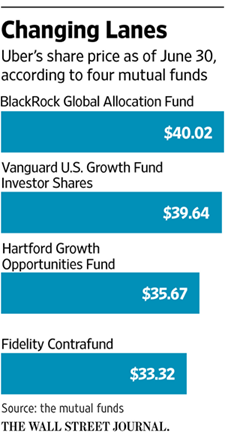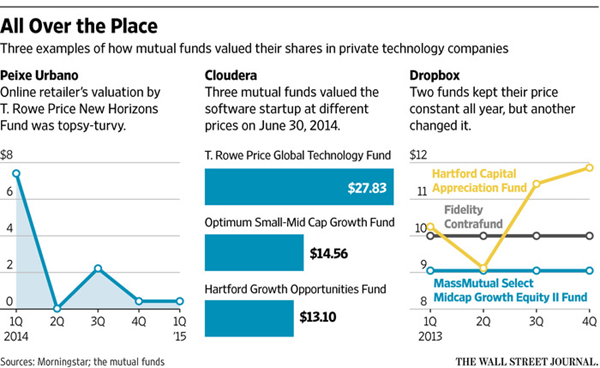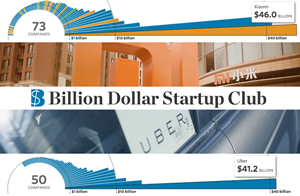|
THE
WALL STREET JOURNAL.
Business
Mutual Funds Flail at Valuing Hot Startups Like Uber
Prices for hot private companies are hard to set and can vary
widely; a 99% plunge at T. Rowe Price
|
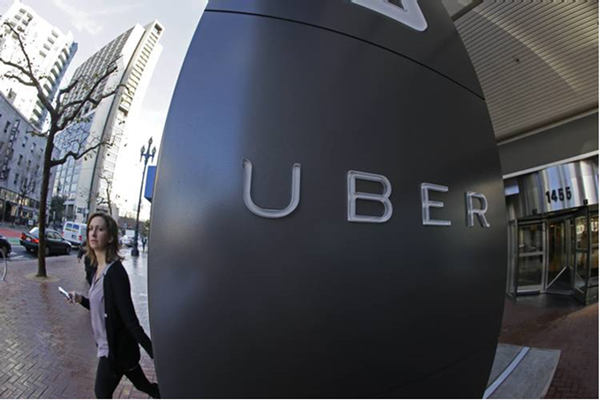
Mutual-fund managers at Fidelity Investments valued Uber's
shares at $33.32 apiece in June, but Vanguard Group said they
were worth $39.64. Above, the car-hailing company’s headquarters
in San Francisco. PHOTO: ERIC RISBERG/ASSOCIATED PRESS |
By
Kirsten Grind
Oct. 29, 2015 11:00 p.m. ET
Millions of Americans own a piece of the hottest private technology
companies through their mutual funds. But no one knows what those
investments are actually worth.
Consider car-hailing king Uber Technologies Inc., the world’s most
highly valued startup. As of June 30, mutual-fund managers at
BlackRock Inc. valued the firm’s stake in Uber at $40.02 a share.
Hartford Financial Services Group Inc. said $35.67. Fidelity
Investments said $33.32.
The differences are a sign of growing danger for individual investors
as mutual funds scramble to buy shares in new tech companies before
they go public. While
getting in early gives those mutual funds a shot at a huge profit
if a company takes off, which happened with
Facebook Inc. and
LinkedIn Corp., many funds struggle just to put a value on their
private-company shares.
In the stock market, prices rise and fall every day in response to
company announcements, economic news and jostling by droves of
investors. Private companies rarely talk in detail or disclose
financial information, leaving their investors in the dark and on
their own to decide how much a stock is worth.
Varying valuations
An analysis by The Wall Street Journal of closely held technology
startups worth at least $1 billion found 12 instances where the same
company was valued differently by more than one mutual-fund manager on
the same date.
The analysis was based on data from research firm
Morningstar
Inc. on about 90 venture-capital-backed companies tracked by the
Journal and Dow Jones VentureSource in a project called
“The Billion Dollar
Startup Club.”
The 12 companies with different prices at different mutual funds
included Uber, valued
at close to $51
billion in a funding round completed in July, and Dropbox
Inc., which was
last valued at $10
billion. The share-price gap ranged from a few cents per
share to more than twice the stock’s price.
Few mutual-fund firms are willing to discuss their valuation
procedures in detail, largely because of competitive concerns, but
mutual-fund firms say they follow a rigorous process.
Donna Anderson, who manages global corporate governance for
T. Rowe Price Group
Inc., says it sometimes feels like “being on a teeter-totter” while
the mutual-fund firm is carefully trying to determine the right price.
T. Rowe Price valued the stake held in software startup Cloudera Inc.
by the T. Rowe Price Global Technology Fund at $27.83 per share on
June 30, 2014. That was roughly twice as high as the valuation by
Hartford and
Macquarie Group
Ltd.’s Delaware Investments on the same day.
Big gaps like that suggest “you’re kind of getting a guess from the
fund company,” says Katie Reichart, a senior analyst at Morningstar.
Mutual-fund valuations of private companies are “pretty opaque,” she
adds.
The consequences can be dramatic. In last year’s second quarter, T.
Rowe Price slashed its valuation of Peixe Urbano from $7.41 a share to
three cents after concluding that the Brazilian online discount
retailer was likely to be liquidated.
Instead, Peixe Urbano was acquired by Chinese online search giant
Baidu Inc.
T. Rowe Price and other mutual-fund firms flip-flopped,
increasing their valuation on Peixe Urbano to $2.22 a share.
Private
Risk
Read a series exploring the intersection of Silicon Valley and
Wall Street in the technology boom.

|
|
For individual investors, the risks are mushrooming as mutual funds
buy more startup stocks than ever. Such stocks are highly appealing to
managers whose investment returns have been hurt by abnormally low
interest rates and this year’s lackluster stock market. Many of those
managers also are struggling to compete with lower-cost mutual funds
that track a market index.
Five of the biggest fund firms participated in funding rounds worth a
combined $6.1 billion at startup companies last year, up from about $1
billion in 2011, according to data from CB Insights. This year’s total
was $8.3 billion as of Sept. 30.
Mutual-fund firms typically get their shares in private companies when
they participate in funding rounds that are open just to a select
group of investors.
Regulators require mutual funds to limit their holdings of “illiquid”
securities to no more than 15% of a fund’s assets. Most mutual funds
have no more than a tiny percentage of their portfolio in startup
stocks.
Financial adviser Tim Parker says some of his clients have investments
in Fidelity Contrafund. He realized only recently that the giant fund
has exposure to Uber. Mr. Parker says he isn’t sure how the fund’s
managers decide what Uber shares are worth.
Fidelity Contrafund owned $162.2 million of Uber as of June 30 and has
total assets of about $103.4 billion. The mutual fund has made a paper
profit of $86.7 million, more than doubling its money since buying
Uber shares in June 2014.
“I would hope that they’re not jacking up the price to prices they
hope to get one day that are completely unattached to recent history,”
says Mr. Parker, a partner at Regency Wealth Management in Ramsey,
N.J.
A Fidelity spokesman says in a statement that the firm has “a rigorous
and thorough fair market valuation process for mutual fund holdings.”
Sean McKee, who audits mutual-fund firms’s private-company valuations
for KPMG LLP, says it is impossible for any investor to know how much
a company is worth until it goes public.
“Until you get to a point where there’s an IPO, there is no one
price,” Mr. McKee says.
Like all mutual-fund managers, those with shares of private technology
companies in their portfolio must assign a current value to the
securities every day so investors get a clear picture of how much the
holdings are worth. Changes can affect the fund’s overall net asset
value, or price per share.
But the shortage of information about private technology companies and
their tiny trading volume create daunting valuation hurdles for fund
managers.
At Fidelity, securities prices are valued in “good faith” when
officials are trying to gauge the impact of events outside the
markets, according to securities filings by the firm.
Mutual funds must disclose their holdings every quarter, though some
funds do so more often. To see how much a private company’s stock has
gone up or down, individual investors usually must do the calculation
on their own by comparing different securities filings.
Some experts say the rising popularity of private tech stocks is
hazardous simply because the shares are hard to sell, lack a broad
secondary market and could react wildly if the overall market swoons.
“We’re all waiting to see how that plays out,” says Babak Yaghmaie, a
partner at law firm Cooley LLP who represents young private and public
companies, including technology startups.
Ms. Anderson of T. Rowe Price says mutual funds are in a tough spot
because they all get different information from startups. “Sometimes
the randomness you’re seeing [with pricing] is we all see different
things,” she says.
At some funds, though, private technology companies are one of the
biggest single investments. Hartford Growth Opportunities Fund, run by
Michael T. Carmen, one of the best-known mutual-fund investors in
startups, had 1.7% of its $4.7 billion of assets in Uber at the end of
September.
In comparison, about 3.5% of the fund’s assets were in
Apple
Inc., which has a stock-market value of more than $650 billion. A
Hartford spokeswoman declined to comment.
Uber’s steep rise in value among investors who have pumped money into
the San Francisco company has bumped mutual-fund returns higher.
Andrew J. Shilling, a portfolio manager at Wellington Management Co.,
which oversees some of the assets in the Vanguard U.S. Growth Fund,
cited Uber as a
reason why the fund trounced its rivals in the latest
fiscal year.
|
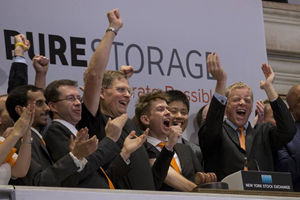
Pure Storage CEO Scott Dietzen, right, and other company
officials ring the opening bell at the New York Stock Exchange
on Oct. 7 to celebrate the company's IPO. Last year, different
mutual funds valued the company's shares at far different prices
on the same date.
Photo: Brendan McDermid/Reuters
|
|
Securities filings show that Vanguard U.S. Growth Fund owns 1.4
million shares of Uber. The fund boosted its estimate of the stake’s
market value by 19% to $55.8 million between Feb. 28 and June 30.
Glenn Booraem, who handles Vanguard Group’s private-securities
valuation, says startups are “inherently more difficult to value on a
stand-alone basis.” That’s one reason why the firm’s portfolio
managers buy private shares “on a relatively limited basis,” he says.
A BlackRock spokesman said in a statement that the firm’s valuation
team “has a rigorous and robust process for valuing private holdings
and regularly updates valuations based on multiple sources of
information.” An Uber spokeswoman declined to comment.
There are no regulatory guidelines for mutual-fund firms to follow,
other than to not knowingly misprice securities.
In 2004, Van Wagoner Funds, a large investor in privately held
startups during the tech-stock boom of the 1990s,
settled civil charges
in which the Securities and Exchange Commission alleged that the firm
misled shareholders about the size and value of the funds’ investments
in illiquid securities.
The mutual-fund firm and its president, Garrett Van Wagoner, agreed to
pay an $800,000 penalty without admitting or denying the allegations.
Mr. Van Wagoner says the firm closely followed its valuation policies
and procedures. “We thought deep and hard about what was the true
value of these securities, but we found out the fundamentals of the
companies were going into a nuclear winter, so we aggressively wrote
them down,” he says.
An SEC spokesman declined to comment on whether agency officials have
any concerns about the valuation procedures now used by mutual funds.
‘Exhaustive’ process
Some mutual funds say it is so hard to value startups from day to day
that they limit their investments in those companies or avoid them
entirely.
Aram Green, a managing director and portfolio manager at ClearBridge
Investments, has invested in just one startup this year, partly
because of what he calls an “exhaustive” valuation process after
buying such stocks.
“I underestimated how time-consuming the process is,” he says. It
includes frequent meetings by the valuation committee of ClearBridge’s
parent,
Legg Mason
Inc.,
to decide if a stock’s price should be changed.
“It’s a lot of information and analysis on a real-time basis,” Mr.
Green says.
Some fund managers turn to private companies for information that
could affect the stock price. But different managers often get
different levels of detail from the same company depending on terms of
their investment, including the type of shares bought by the mutual
fund.
In return, some mutual-fund managers get “board observation rights,”
which allow them to listen to a company’s board meetings.
Lower-ranking investors might get just a copy of the company’s
unaudited financial statements every quarter, according to accountants
and fund executives.
Sometimes, mutual funds don’t change their price of a startup’s shares
for a year or more. Fund executives say that reflects the information
shortage.
In 2013, Fidelity Contrafund never changed its quarterly price on
Dropbox, according to data from Morningstar. Neither did the
MassMutual Select Midcap Growth Equity II Fund, though the two funds’
per-share valuations of Dropbox were about 10% apart.
In contrast, Hartford Capital Appreciation Fund moved its valuation of
Dropbox up or down in all four quarters of 2013. The three funds
sharply boosted their valuations after the online storage provider
completed a new funding round.
Fidelity, Hartford and Dropbox declined to comment. A spokesman for
the MassMutual mutual fund, part of insurer Massachusetts Mutual Life
Insurance Co. couldn’t be reached.
In March 2014, Fidelity’s flagship Fidelity Magellan Fund valued
storage systems maker
Pure Storage
Inc.
at $9.25 a share. T. Rowe Price New Horizons Fund said
Pure Storage was worth $6.93 a share—or 25% less.
Pure Storage completed a funding round in April 2014. In June, the two
mutual funds valued the company at $15.73 a share. The company
went public in
October at $17 and now trades near $18.
Fidelity and T. Rowe Price wouldn’t comment on the values they
assigned to Pure Storage shares.
The swings in Peixe Urbano’s valuation show how hard it is to piece
together an accurate picture of a startup company. T. Rowe Price
bought its stake when daily deals sites like
Groupon
Inc.
and LivingSocial Inc. were popular.
But by mid-2014, “it was very clear” that Peixe Urbano was “not on
plan,” says Ms. Anderson of T. Rowe Price.
The firm says it has a rigorous, longtime valuation process that
examines many factors related to startups.
The firm’s New Horizons Fund owned about 600,000 shares of Peixe
Urbano. Morningstar says the 99% slide probably didn’t affect the
fund’s overall performance last year because Peixe Urbano was less
than 0.5% of the fund’s assets. A Peixe Urbano spokeswoman declined to
comment.
T. Rowe Price was taken aback again when Baidu swooped in to rescue
Peixe Urbano by buying a controlling stake.
It was “a surprise move, at least to us,” Ms. Anderson says.
Write to
Kirsten Grind at
kirsten.grind@wsj.com
|

